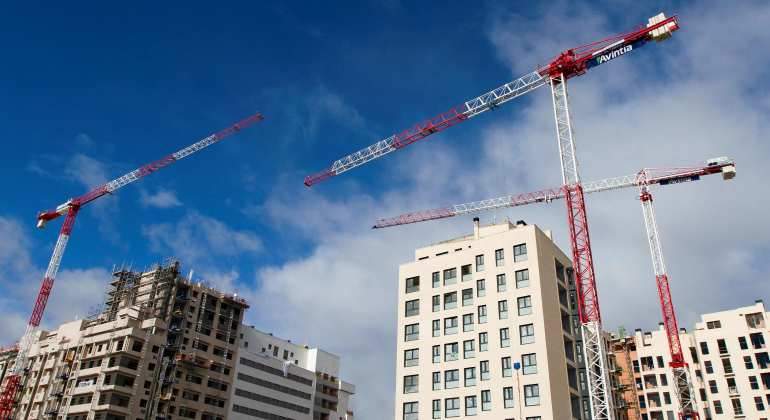The residential development sector is on alert before the surprise measure that the new Housing Law will supposedly include and which involves allocating 30% of new construction projects to protected housing, with half of this percentage being rented flats.
This measure has set off all the alarms in the sector, which warns that if this is carried out, a large part of residential production could be paralyzed in the areas of Spain that decide to implement this standard.
From the Ministry of Transport, Mobility and Urban Agenda (Mitma) they assure elEconomista that the objective of this measure is none other than to increase the stock of social housing in our country , especially in the rental regime, and point out that they do not understand the situation of concern that has been generated in the sector.
Thus, they recall that currently, according to the State Land Law, all the lands that are planned must reserve 30% for protected housing, “what will happen now is that 50% of that percentage must be used for rent,” they emphasize.
On the other hand, for the lands that are already finalists and that are already in the promoters’ portfolios, they emphasize that the new Law does not oblige this assignment , but leaves the possibility of requesting this assignment from the promoters in the hands of the town councils. each project . “It is not mandatory, it is a decision that will be made by the Town Councils and that can be carried out as long as the Consistory is capable of complying with the compensation system that we have designed,” they clarify.
How will they be compensated?
In this sense, the Ministry explains that “when urban planning is carried out, economic rights are obtained over that land, which are called exploitation.” This will be the key to the compensation system that they are going to apply, since if a City Council requests a developer to allocate 30% of the project to VPO, it must “compensate him with another land that has the same use value in the same location or in other”.
In this way, if a developer is going to build a project with 100 homes and the City Council requests it, he must allocate 30 units to VPO and of these 15 will be for social rent.
“It does not make sense that they compensate us that 30% by giving us square meters”
The developers, however, do not see that this compensation system is viable and consider that it generates “enormous legal uncertainty in the sector, which will keep investment away and will lead to a transfer of the real estate activity to those areas that do not apply this measure”.
“It does not make sense that they compensate us that 30% by giving us square meters in another place that does not have to have the same commercial success and we would also be going from doing a large work to a small one,” they explain.
Likewise, they denounce that they cannot be at the mercy of what the municipalities want, “building houses where they want, when they want and with a fair price that will be very difficult to fix . ” “What is going to happen is that construction will stop in the areas where this measure is applied, since it will generate a situation of unprecedented legal uncertainty in Spain.”
On the other hand, developers are concerned about the management of social rental housing , since most of the developers are not patrimonial and therefore do not have a team specialized in the management of apartments in profitability.
In this sense, from Mitma they assure that the promoters will be able to sell these houses as long as they remain in a social rental regime and they believe that “there will be no problem in transferring it to other investors or funds.” However, companies in the sector are not so clear that these rental homes are going to have an easy divestment, “taking into account the legal uncertainty that this regulation is generating in the sector.”
Difficult application law
According to the promoters, this is a Law of “a marked political character and of almost impossible fulfillment, since it invades the autonomic competitions and surely some regions will appeal it as unconstitutional when they have the possibility to do so”. They assure that to carry out this regulation they have to “start by modifying their own Land Law and to make the surcharge of up to 50% of the IBI to empty flats they have to modify the local Treasury Law.”
In addition, they point out that if it is processed through normal channels within Congress, it is a somewhat long process that can take several months and they doubt that they will find the majorities they need to approve it.
The example of Catalonia
When promoters speak of an investment flight as a result of the new State Housing Law, they do so by looking towards Catalonia , where measures very similar to those included in the new regulations have been applied for some time now, such as price control in the rental market and the obligation to allocate 30% of the projects to social housing.
From APCEspaña they assure that these measures will not only transfer the investment from some autonomous communities to others, but could even expel the institutional capital of Spain “depending on how affected the legal security may be in the final text of the law.”
To make these statements, they are based on a survey carried out by the Association of Promoters and Builders of Catalonia among its associates, which shows that 55.3% have stopped investment waiting for a new scenario, while 31.6% have reduced their investment and 13.1% have transferred their investment to another territory.


